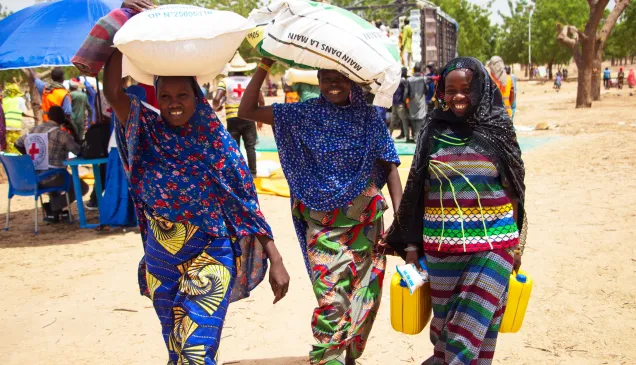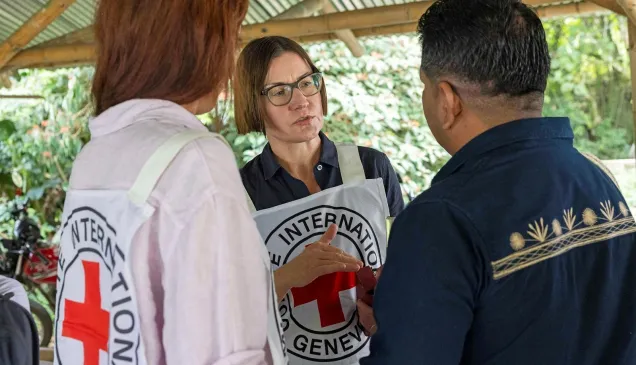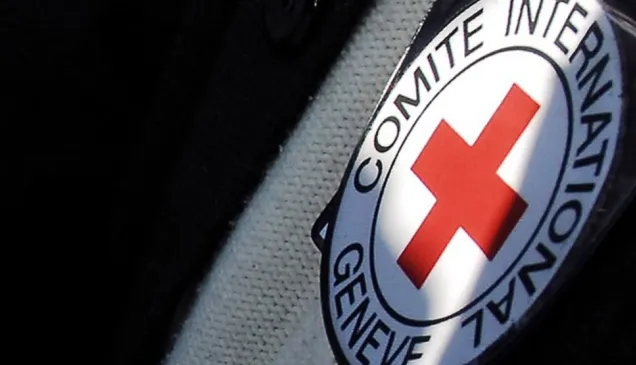31st International Conference 2011: Resolution 6 - Health inequities
Health inequities: with a focus on women and children. 31st International Conference of the Red Cross and Red Crescent Movement (International Conference), Geneva, Switzerland, 28 November-1 December 2011.
The 31st International Conference of the Red Cross and Red Crescent,
agreeing with the World Health Organization that "the enjoyment of the highest attainable standard of health is one of the fundamental rights of every human being" and noting that according to the World Health Organization: "[w]here systematic differences in health are judged to be avoidable by reasonable action they are, quite simply, unfair. It is this that we label health inequity. Putting right these inequities – the huge and remediable differences in health between and within countries – is a matter of social justice. Reducing health inequities is, for the Commission on Social Determinants of Health (hereafter, the Commission), an ethical imperative. Social injustice is killing people on a grand scale."
recognizing that to reach Millennium Development Goal 3, Millennium Development Goal 4 and Millennium Development Goal 5, social and gender inequalities need to be addressed,
being fully aware that health inequities are not limited to women and children,
noting for the purposes of this resolution that whenever speaking about children, adolescents, and young adults it should be understood that actions proposed should be undertaken with due regard to age and maturity,
being concerned that health inequities in many circumstances may be the result of human rights violations, and other economic and social factors,
recognizing that no single actor can tackle health inequities alone,
recognizing that addressing health inequities includes addressing social determinants of health,
acknowledging that reducing health inequities requires the strong leadership, political will, and financial commitment of governments as well as strong international cooperation,
recognizing that dismantling barriers to health equity can strengthen community resilience,
recalling the International Covenant on Economic, Social and Cultural Rights, the Convention on the Rights of the Child and the Convention on the Elimination of all Forms of Discrimination against Women, as important legal frameworks to strengthen protection against health inequities for women and children,
recalling Resolution 2 of the 30th International Conference recognizing the special partnership between public authorities and National Red Cross and Red Crescent Societies (National Societies) as auxiliaries in the humanitarian field, a partnership that entails mutual responsibilities and benefits. In agreement with public authorities, National Societies deliver humanitarian services, many of which contribute to removing barriers to care and increasing the equitable delivery of prevention, treatment, care and support,
- calls on States and National Societies, in accordance with the special status of National Societies as auxiliaries to the public authorities in the humanitarian field, to work together to commit to reducing health inequities, beginning with removing obstacles to reproductive, maternal, newborn and child health through a needs-based approach informed by human rights with a particular emphasis on the rights of the child;
- encourages international organizations such as the United Nations, the World Health Organization and the World Bank and relevant regional organizations to increase their efforts in reducing health inequities, including through implementation of the 2011 Rio Political Declaration on Social Determinants of Health;
- invites partnership at community, national, regional and global levels with States, civil society, donors and the private sector to reduce health inequities most quickly and effectively;
- strongly encourages States and calls upon National Societies to work together and commit to action in the following three key areas, articulated to guide a needs-based and strategic approach to health inequities: 1) provision of health-care services, 2) promotion of knowledge and 3) commitment to gender equality and non-discrimination;
I. Provision of health-care services: Provide prevention, treatment, care and support when and where they are needed to women and children
National Societies are called upon to:
1) scale up efforts to bridge gaps between communities and health facilities, and between pre-pregnancy and child care, and improve access to prevention, treatment, care and support to those women and children, as well as adolescents and young adults who would otherwise have limited or no access;
2) establish links with States and civil society organizations to survey, evaluate and measure the state of health inequities and the impact of policies and programmes to reduce health inequities, using existing frameworks and tools;
3) use their status as auxiliaries to their public authorities at all levels to engage in dialogue, review existing health plans and where necessary advocate for equity;
4) monitor and evaluate progress towards equitable health, including access to and quality of reproductive, maternal, newborn and child health, as well as that of adolescents and young adults;
States are strongly encouraged to:
5) remove legal and regulatory barriers in the formal health sector and other government services where barriers exist;
6) allocate available health resources according to need;
7) aim at ensuring available and safe, accessible and affordable and adapted to the local context, quality health care for all women and children;
8) aim at improving prevention, treatment, care and support for women and children without compromising the quality of prevention, treatment, care and support for other segments of society;
9) encourage the formal health sector to ensure non-discrimination and improve the quality and character of patient-provider interactions by increasing ethical practices and professional health care standards, possible examples include posting patients' rights in health centres, adopting ethical charters, forming independent ethics commissions and training health-care workers on ethical practices and gender sensitivity;
10) address the critical shortage of 'human resources for health' and to support national strategies for Human Resources for Health retention, education and deployment;
11) further research into health inequities in countries where, in addition to the burden of reproductive events, women also face a disproportionate burden of chronic diseases.
II. Promotion of knowledge: Provide reliable and accurate information on health and encourage healthseeking behaviours, for women and children, as well as for adolescents and young adults
National Societies are called upon to:
1) scale-up and measure efforts in providing reliable, accurate information on reproductive, maternal, newborn and child health;
2) scale-up and measure efforts to encourage appropriate health-seeking behaviours and break down local barriers to safe motherhood and healthy childhood;
3) engage in advocacy on health-seeking behaviour and strengthen partnerships with States and civil society organizations to extend advocacy effectiveness;
States are strongly encouraged to:
4) recognize that quality, reliable, and up-to-date health education is essential to reducing health inequities and to enabling women and, when appropriate, children, adolescents and young adults, to make informed, autonomous decisions on health;
5) take the lead in providing education on healthy behaviour and practices that account for the specific local context;
6) ensure that education campaigns target the information needs of the population as a whole and pay special attention to the needs of those in vulnerable situations;
7) stimulate multi-sectoral action to support healthy choices;
8) create policies that encourage appropriate health-seeking behaviours and enable health promotion strategies;
9) involve civil society organizations in implementing campaigns to disseminate health information.
III. Commitment to gender equality and non-discrimination: Promote gender equality, nondiscrimination and end violence against women and children
National Societies are called upon to:
1) scale-up efforts for social inclusion by nondiscrimination programming and by ending violence against women and children;
2) set the example of gender equality in their own policies and programmes and to serve as role models for governments, civil society organizations and the private sector;
3) as auxiliaries, encourage States to adopt the principle of equity in legislation and public policies and set the example of ensuring children's rights by considering the needs and rights of children in programme and policy-making, as well as serving as role models for States, civil society organizations and the private sector;
4) encourage women for greater decision making and ownership and enable men to take on their responsibilities linked to sexual activity and fatherhood;
States are strongly encouraged to:
5) make a firm commitment to gender equality, non-discrimination, and to ending violence against women and children in their constitutions, legislation and national policies, including health policies, and to ensure appropriate enforcement mechanisms;
6) engage in gender mainstreaming in programmes and policies;
7) empower women and girls, and engage men and boys in empowering women and girls, in the planning process and delivery of outreach on gender equality, non-discrimination, and ending violence against women and children and engage men and boys in challenging damaging gender stereotypes;
8) give special attention to early child development in all public policies and social and health services.



